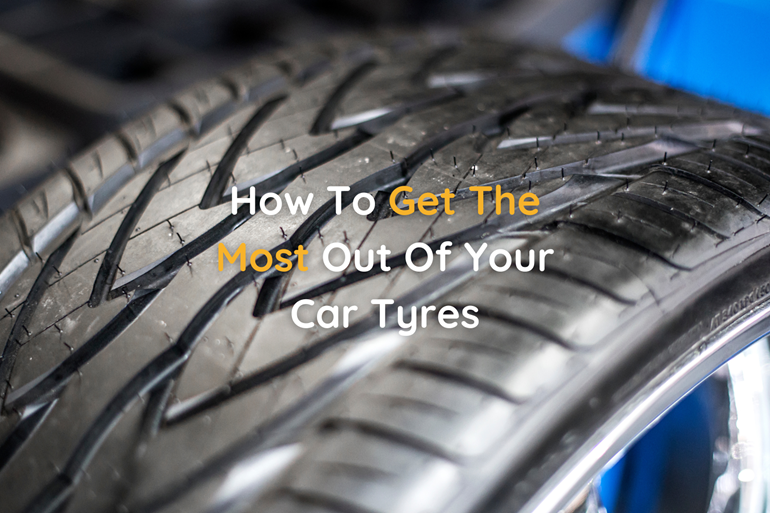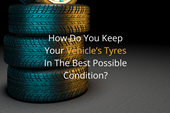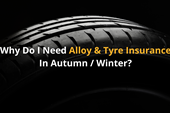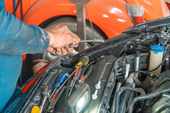
How To Get The Most Out Of Your Car Tyres
Keep Your Tyres In Top Condition With Our Latest Guide...
Car tyres are one of the most important components of your car, providing grip on the road and keeping you in control while driving. It is really important to keep your tyres in good working condition so that you stay safe on the road and minimise the risk of a tyre blowout.
Unfortunately, between potholes and accidental scuffs on the kerb, car tyres and alloy wheels are prone to scrapes, gouges and all kinds of damage. Whether you care about keeping your new tyres in top condition for looks or safety, it is always a good idea to regularly check on your tyres and inspect them for damage. Failing to do so could leave you with costly repairs down the road.
This guide is going to offer some advice to keep your car tyres and alloy wheels in top condition so that you can get the absolute most out of your car when driving.
Regular tyre and alloy wheel inspections
It is always a good idea to give your wheels a visual inspection before setting off to drive. Not only will this let you know if you have any flat tyres, but you can take a look for cosmetic damage like scrapes on your alloy wheels or chunks missing from the tyres. There are all sorts of red flags to keep an eye out for when inspecting your tyre, such as:
- Bubbles or bulges on the sidewall of the tyre
- Any objects that have become lodged in the tyres (nails, metal, glass etc.)
- Cuts or chunks of rubber missing from the tyre
If you do notice any issues with your tyres, get them checked out by a professional mechanic. If caught early enough, some of these issues can be repaired. Other times a full replacement tyre will be required, but in either case, it is strongly advised that you do not drive with damaged tyres.
"If you don’t keep an eye on your tyre pressure, you are setting your car up for problems down the road. Not only can low pressure tyres affect fuel consumption, handling, braking and control of your vehicle, but it increases wear and tear on the tyre and risks a blowout."
Keep an eye on tyre pressure
Another good idea is to take note of any deflation in your tyres before driving off. A visual inspection is good, but you ideally want to check the tyre pressure on a regular basis. Most petrol stations have an air pump that you can use to check your tyre pressure. If you are unsure what the pressure of your tyres should be, check the user manual.
Tyre pressure is measured in PSI and it is highly recommended that you check your car user manual, as this will specify the best tyre pressure for your car. You may also be able to read the recommended tyre pressures on the tyres themselves. If in doubt, check with whoever fitted your tyres last.
If you don’t keep an eye on your tyre pressure, you are setting your car up for problems down the road. Not only can low pressure tyres affect fuel consumption, handling, braking and control of your vehicle, but it increases wear and tear on the tyre and risks a blowout.
Do not tread lightly (or drive with no tread on your tyres)
Your tyre treads are the grooves found on car tyres that provide grip and traction while driving. Over time, these treads wear down and become less effective on the road, so it is important to check them regularly.
The minimum tread depth is set at 1.6 mm, but you won’t need to take any accurate measurements if you have some loose change on you. You can quickly assess the tread of your tyre by placing a 20p coin into one of the main tread grooves. If the raised edge around the coin is visible, then you might want to consider replacement tyres.
If you are unsure about your tyre tread, be cautious and get it looked at by a professional mechanic. Driving with tyres under the minimum tread depth is more than dangerous, it is illegal.
Look into tyre insurance and alloy wheel insurance
Whether you are wanting to keep your car tyres in excellent condition or are just wanting to be cautious, tyre insurance and alloy wheel insurance is a little known form of insurance coverage that can help. This low cost, high return insurance policy can protect you and your wheels from the costs of repairs and replacements should anything go wrong with your tyres.
Tyre insurance and alloy wheel insurance generally covers all types of unforeseen damage to your alloys and tyres, so you won’t have to fork out a lot of money on repair bills should anything go wrong with your tyres.
These types of insurance are a great addition to your car insurance if you have expensive tyres and alloy wheels. However, it is equally useful if you have run of the mill tyres, as it can be expensive to repair or replace your wheels or alloys.
There are lots of ways that you can maintain the health of your car tyres to keep them going for longer. If you are interested in learning more about tyre insurance or alloy wheel insurance, contact us today at Direct Gap Insurance.












